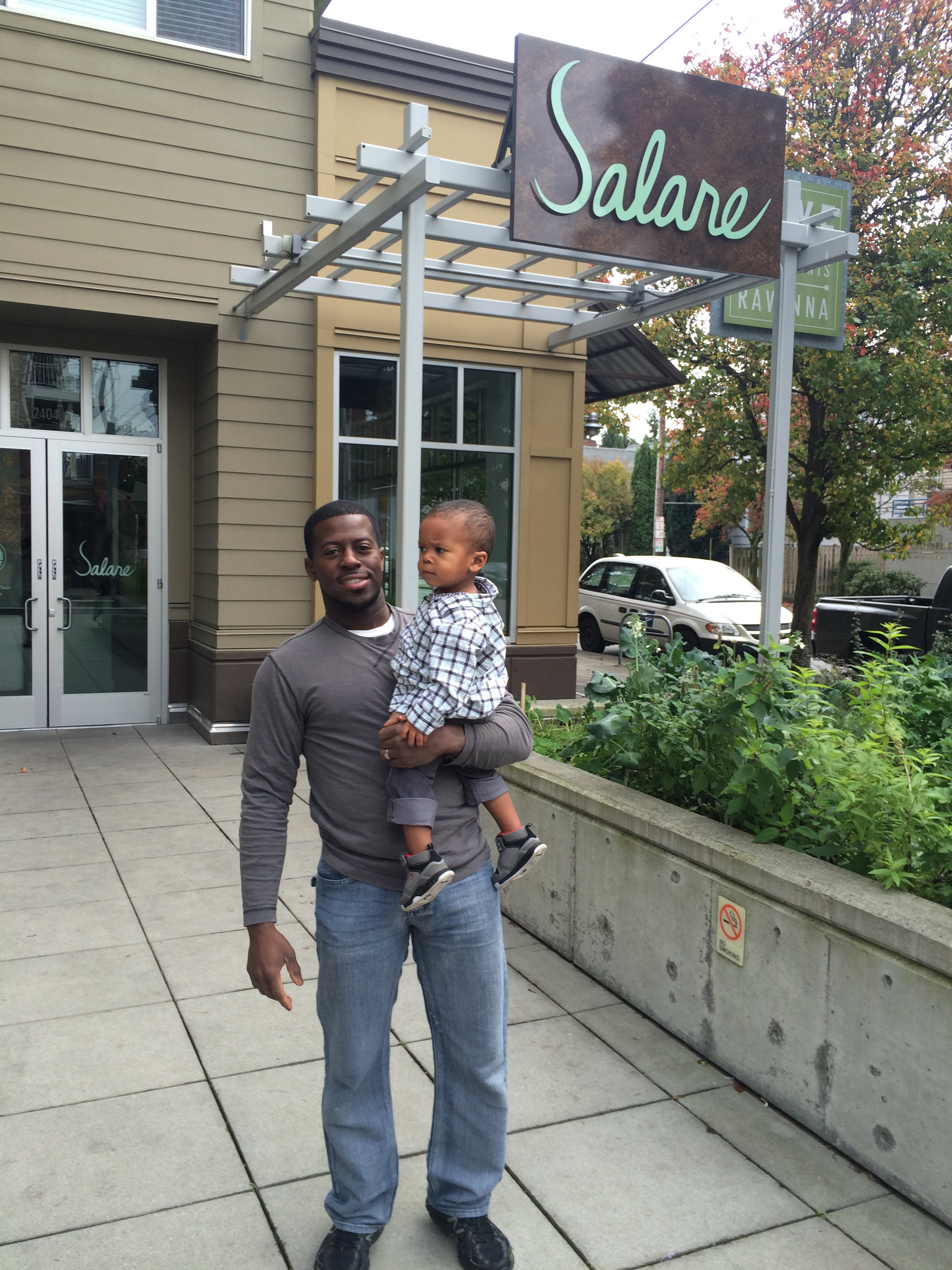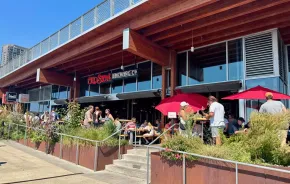
Chef Edouardo Jordan has plenty of reasons to smile. He has been described as a rising star in Seattle’s culinary scene. Salare, his Ravenna restaurant has been attracting rave reviews, not to mention a robust business (Salare’s foyer is often packed with people happy to wait 30 minutes or more for a table). But one diner matters more than all the rest. Jordan lights up when he talks about feeding his 2-year-old son, Akil. “The first time he tasted my beets, apple and ricotta mix he did a happy dance.”
Jordan has spent many years working alongside acclaimed chefs here in Seattle and beyond, but he consistently cites his grandmother as his first, and most noteworthy, teacher.
“Cooking with my grandmother was all about learning to cook with heart and soul. No recipes. She was an old-school Southern cook who put her touch on everything she created.” A native of Florida, southern cuisine is a consistent influence on his menu from appetizers like sweet potato fritters to the collard greens and “dirty rice” side dishes accompanying entrees.
Entering the airy, comfortable space of Salare, the southern vibe is fully apparent in the long communal table, the chalkboard wall for the day’s specials and the rustic wooden shelving behind the bar.
Along with being the owner and chef of Salare, which opened for business in the summer of 2015, Jordan works hard to be involved in his young son’s life. Of managing both, he says, “The balancing act is always the hardest part. I’m still trying to figure it out. I mean, this is my baby, plus my baby at home, you know.”
Salare guests are likely to catch a glimpse of Akil scampering through the dining room. Jordan designed the space with kids in mind. Despite the restaurant’s growing reputation as a world-class culinary establishment, Jordan says, “I’ve worked to make it family-friendly. My wife and son are in here all the time. I wanted the neighborhood to be able to bring their kids out and not feel like they had to lock chains on the kids so they won’t run around. I want kids here to be happy.”
Watching Jordan interact with his son, it is clear the two have a familiar and loving relationship. Like many toddlers, Akil peppers his dad with questions and pleas for attention and Jordan responds with a loving, yet firm, presence. After pushing his sippy cup out of reach onto a high table, Akil clamors for help getting it back, but Jordan insists on hearing the word “please” before retrieving it.
Opening and running Salare, while raising a toddler has undoubtedly been a challenge for the chef and his wife, Usana, but Jordan presents a calm and competent demeanor as he takes time out of his busy schedule to tell us a little about it.
What are the biggest challenges of balancing your work with parenting?
That’s the biggest thing. . . balancing. Being able to be here full time, plus some and also having that quality time at home. I’ve learned now to take my weekends (referring to Monday and Tuesday when Salare is closed) and really take them. I purposely wanted the restaurant to be closed two days so that I could have downtime. I try to do a lot of my work early in the morning or late at night so that I can spend my weekends with my son. My wife has been a part of my career from the start so she knows the hours I work and we figure out time together. We take vacations together and go to dinner whenever we can. She’s actually on a totally different schedule than I am. She’s a teacher. But we work it out. She’ll stay up late at night so that we can spend some time together.
How does being on different schedules work in terms of taking care of your son?
On days I work, I wake up early with Akil and get him to preschool. It’s only about an hour in the morning that I get to see him, unless I’m waking him up at night, which is a no-no (laughing). From there, my wife takes care of him once preschool’s over and she’s out of work. And on my weekends, it’s all me.
Your cuisine is pretty diverse and distinctive. What are your recommendations to parents whose kids aren’t open to trying new things?
I think that parents need to be open to new things, themselves and incorporate that into their normal diet. Early on, I started incorporating the kinds of things I like into my child’s diet and I’ve noticed that most kids don’t eat like that. It’s important to me that he’s healthy and all that, but it’s also important that he be opening his palate from the start and that’s the advice that I would give parents. You can’t wait until they’re seven years old to start putting brussels sprouts on the plate. Start really young. Puree it up and put it into a sauce or something or just give them the outer petals rather than the whole crunchy brussels sprout.
You have a children’s menu. What have you done to make dishes that kids like?
Actually, our first kids’ menu was created with the help of kids from the neighborhood. They told me what they liked eating and l listened to them and took some of their advice. I created the kids’ menu thinking of what my child eats and what I feed him. I wanted to show parents that these are cool things that children could eat and should eat. I avoided fried foods on the kids’ menu and super saucy things. I incorporated things that I would feed my child. This is Akil’s menu.
Do you see a lot of kids here?
We do! Earlier in the week, more families come here, you know on Wednesday and Thursday. I think Fridays and Saturdays are date nights for a lot of parents so they get a babysitter and leave the kids home.
I’ve read a bit about your no-waste philosophy. What does that mean to you?
A lot of people say nose-to-tail cooking. And I agree with that, but I like to think about root-to-leaf cooking too. I think it’s important to respect the energy and the time that farmers take to grow these beautiful ingredients. I mean why are we taking the tops off and just cooking the roots? Or the only thing we’re cooking is the leaves. It’s a challenge for me as a chef to say, what can I make with this? And it’s also about running a good business. Everything that comes into this restaurant needs to be fully utilized. I try not to waste anything and, you know, some things don’t work out. I’ll find out before I send it to the table, but at least I want to try.
You used a Kickstarter Campaign to fund your restaurant and your tagline was, “it takes a community to raise a restaurant.” What does that mean to you?
I always wanted to open a restaurant in a neighborhood that would sustain that restaurant. And that’s why I looked at this neighborhood. Because I saw that there wasn’t a restaurant of this caliber here. I definitely wanted to be in a neighborhood that would come out and sustain it. And that’s been happening since day one when I started the campaign. It was just kind of mind-blowing how much support came from the neighbors. And some of the biggest supporters were local farmers who I’ve worked with. They knew exactly what I was doing. They’ve seen it and they know my story. And I still support them. They help me and I help them. And it’s the same with the neighborhood. I’m bringing good food to the neighborhood and they’re keeping the doors open.
I’ve heard you even buy some produce from neighbors?
I’ve purchased honey from a couple of people in the neighborhood who keep bees. People come knocking at my door with nasturtiums or herbs and I’m happy to open the door to them.
Your career has taken you to many international places. You’ve studied in Italy, for example. Are there any destinations that you look forward to visiting with your son?
I am planning a trip to Spain on my own soon. But that’s definitely a place I want to take Akil to visit. Every trip that I take, I think it’s just going to be a vacation but it always becomes a food adventure. Our next family trip is going to be to Hawaii and I know we’ll end up searching out the best seafood or whatever. But, yeah, I definitely want to take him to Europe someday — Italy, Spain, France.
You’re known for your training in France and Italian cooking. Are there any other areas in the world that you would say influence your cooking?
The South, definitely, because that’s where I’m from. My initial training was in Southern cuisine. And I incorporate a lot of Caribbean influences into my food because, you know, I’m from Florida and I grew up eating a lot of Puerto Rican, Haitian, and Cuban dishes. They have really influenced me. Now I’m dabbling in African cuisine because it’s the motherland for me. Things I’ve never learned about before and now I want to learn about it, so you’ll start to see a lot of African spices on my menu. I’ve been making my own spices and mixes.
What’s an example of an African spice to look for on your menu?
One that you could currently see on our menu is tsire, a mixture of peanuts, chili powder, cinnamon, ginger, nutmeg and allspice.
I know Akil’s still little, but do you ever cook with him?
Yes! All the time! He actually gets angry with me when he sees me cooking without him. In the morning I make him scrambled eggs and I pick him up and let him stir them. So when he’s in his high chair and he sees me cooking, he’s like, “Stir! Stir! Stir!” and that means that he wants me to pick him up so that he can stir the food. Another thing I’ll do is when I’m cooking is I’ll pick him up and let him smell it, you know as long as it’s not popping or something, but I let him smell it and he gets all excited. He notices when I start popping the eggs. He’s a bit of a foodie. (laughing)
 Do you have any favorite dishes from your menu?
Do you have any favorite dishes from your menu?
I can never answer that one. I let my guests answer that for me. I’m always most excited about the new things I’m cooking. You know, I don’t have staples. I’m always adapting, so I don’t want people to get attached to anything. My farmers will bring something new in the door and I get excited to make something new with it. But my guests currently love the duck, the yellowtail crudo — that’s been really hard to take off the menu. Dessert-wise, an old dish that people went nutty over was a corn brûlée that we made. We took corn and juiced it and took a crème brûlée base and you just get this intense corn flavor with the crunchy sugar on top. It was pretty amazing. But again, our dishes are always changing, you know, so as soon as everyone loves something, it’s going to switch, so, you know.
So you don’t want people to get their heart set on anything?
No don’t do that! I want you to come with open eyes and open heart and an empty belly and just go for it.
Growing up, what are your favorite memories of family meals?
My family always did Sunday suppers at my grandmother’s house and it was a time that all of us could all come together — cousins, uncles, aunts, from Grandmother — all come together and just socialize and hang out over a meal. One of the highlights of food for me, and the beginning of cooking for me, was cooking with my grandmother and cooking with my mother and then inviting the whole family over and we would share a big meal together. On Thanksgiving it became a tradition that I stayed over at my grandmother’s house and helped out, ‘cause it took two or three days to prepare the meal and everything had to be prepped out and I was like her little sous chef, I guess you could say.
How old were you when that started?
I was probably around 10 or 11. I started cooking with my mom originally at around 9 or 10 and I was like, this is kind of cool. People get excited about food. I remember the first meal I ever made was for Mother’s day. Just like eggs and burnt toast, you know. And just to see the warmth on her face. You know, so happy that I’d done it. And I was like, this is cool, you know. So I just kind of kept going with it.
Describe your typical day of work.
I wake up around 8 or 8:30 with Akil. Get him dressed and cook breakfast for him. I drop him off at school around 9:30 or 10. Then I’m headed here. From there I’m checking the menu to make sure we have all the ingredients in-house or do we need to change something. And then, I’m starting to prep, just getting things ready for my crew, whether that’s making sauces or butchering fish or meat to just getting a jump start on the day. And then around 1 my crew comes in and I’m coaching them through the day. By 4 o’clock, I’m doing menu talk with the front of the house staff, explaining any changes we have and going over things that they might be concerned about. In some ways, I’m like a coach or a cheerleader, you know, pumping them up and saying let’s do this! At 5 o’clock, service is starting, and I’m getting everyone excited about service. And then making sure my crew, the back of the house staff, is all prepped. And then service is from five to ten at least and we’re just pumping it out from there. By 11 o’clock, we’re scrubbing down, cleaning up and doing our orders and then home by midnight.
What’s one tradition you learned from your grandmother that you’d like to pass down to your son?
Simply share and enjoy time in the kitchen together as an opportunity to learn and connect with one another. Our father-son time will be more than playing catch.
If you visit Salare:
When: Dinner is served, Wednesday–Sunday, 5 p.m.–close, brunch, Saturday and Sunday, 10 a.m.–1 p.m.
Where: 2404 N.E. 65th St. in Seattle
Prices: Small and large plates ranging in price from $5–$28. Kids' menu items are $9/each
Parking: Street parking is free
Reservations: Not necessary, but a good idea, especially on Friday and Saturday nights
Menu: Always changing, but expect to find a good mix of seafood, vegetarian, pasta and meat options. Items on the kids menu include dishes like mac and cheese made with ham, bechamel and three cheeses or a meatball served with chickpeas and greens.












